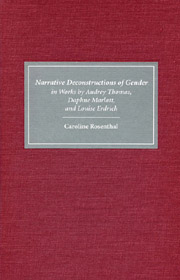Book contents
- Frontmatter
- Contents
- Dedication
- Preface and Acknowledgments
- Abbreviations
- Introduction
- 1 Framing Theories
- 2 “Alice Hoyle: 1,000 Interlocking Pieces”: Identity Deconstructions in Audrey Thomas's Intertidal Life
- 3 “You Can't Even Imagine?”: Monstrous Possibilities of Female Identity in Daphne Marlatt's Ana Historic
- 4 “Her Laugh an Ace”: Narrative Tricksterism in Louise Erdrich's Tetralogy
- Conclusion
- Works Consulted
- Index
3 - “You Can't Even Imagine?”: Monstrous Possibilities of Female Identity in Daphne Marlatt's Ana Historic
Published online by Cambridge University Press: 05 February 2013
- Frontmatter
- Contents
- Dedication
- Preface and Acknowledgments
- Abbreviations
- Introduction
- 1 Framing Theories
- 2 “Alice Hoyle: 1,000 Interlocking Pieces”: Identity Deconstructions in Audrey Thomas's Intertidal Life
- 3 “You Can't Even Imagine?”: Monstrous Possibilities of Female Identity in Daphne Marlatt's Ana Historic
- 4 “Her Laugh an Ace”: Narrative Tricksterism in Louise Erdrich's Tetralogy
- Conclusion
- Works Consulted
- Index
Summary
Introduction: “a monstrous leap of imagination”
“This is a child! […] We only found it to-day. It's as large as life, and twice as natural!” “I always thought they were fabulous monsters!” said the Unicorn. “Is it alive?” […] Alice could not help her lips curling up into a smile as she began: “Do you know, I always thought Unicorns were fabulous monsters, too? I never saw one alive before!” “Well, now that we have seen each other,” said the Unicorn, “if you'll believe in me, I'll believe in you. Is that a bargain?” “Yes, if you like,” said Alice.
Lewis Carroll, Alice in WonderlandFor Daphne Marlatt's 1988 book Ana Historic, Lewis Carroll's writings are also important subtexts as they question conventions and playfully illustrate that what is real depends on cultural frameworks and individual perspective. As another contemporary Canadian woman writer who breaks down linguistic and narrative structures, Marlatt seems to share a lot of Audrey Thomas's aims and strategies. Like Thomas, Marlatt disrupts surface structures to defamiliarize accepted notions of femininity and to question the coherence and continuity of gender and sexual identity. Both authors mirror the process of identity (de)formation in the narratives of their protagonists who are both writers themselves. This makes the novels self-reflective, they tell stories just as they contemplate the conditions of storytelling and the correlation between storytelling and identity formation.
- Type
- Chapter
- Information
- Narrative Deconstructions of Gender in Works by Audrey Thomas, Daphne Marlatt, and Louise Erdrich , pp. 66 - 106Publisher: Boydell & BrewerPrint publication year: 2003



